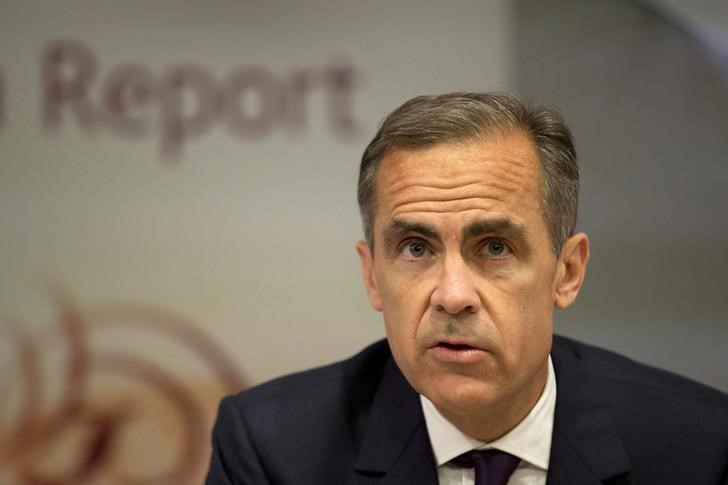Investing.com – Bank of England (BoE) governor Mark Carney insisted Thursday that the British monetary authority continues to assume a “smooth transition” as the UK undertakes the process of its departure from the European Union (EU), known as Brexit, and insisted that the current issue of wages increasing at a lower rate than prices would pass at the turn of the year.
Earlier, and in line with market expectations, the BoE kept the benchmark interest rate at a record low of 0.25% and left its asset purchase program unchanged at £435 billion earlier on Thursday.
Also as expected, the decision to maintain interest rates was undertaken in a vote with six members of the BoE’s Monetary Policy Committee (MPC) in favor while members Michael Saunders and Ian McCafferty dissented, repeating their previous call for a 25 basis-point increase.
BoE expects smooth Brexit transition
Carney began the posterior press conference by stating that the UK was beginning to adjust to a “new and uncertain” relationship with the EU.
He admitted that the BoE could not prevent weaker real incomes for the British people but could work to influence the playoff between job losses and increases in prices.
Carney stated that the uncertainty surrounding Brexit would weigh on growth as some companies were delaying decisions about investment and entering new markets.
He further indicated that the process was beginning to affect the British economy’s supply capacity.
Despite these negative effects, Carney insisted that both the UK and EU were working to avoid a disruptive process that would not be in either’s interest which is why the BoE was using a “smooth Brexit” as its base case scenario.
Wage squeeze to pass
Although Carney admitted that the British public had been hit by weaker real wages, he stated that they were already adjusting to that effect and that he expected consumer spending to rise in line with salaries, rather than be increased by borrowing.
“We’re going through a sluggish period now,” Carney admitted, with “prices going up in shops and wages haven’t been accompanying”.
However, though Carney recognized that the UK was “in the teeth” of the problem, he was optimistic about the turn of the year, stating that “we will move out of this real income squeeze”.
Rates could rise faster than market expects
With regard to monetary policy, the MPC indicated in the minutes that it now expects two rate increases over the forecast horizon, compared to its prior estimate of just one.
Carney suggested that rates could rise “faster than the markets expect, but slower than in a traditional cycle”.
However, the BoE chief avoided offering specific clues on the timing of the rate hike as it “would not be appropriate for me to tie the hands of the Monetary Policy Committee by expanding on our view”.
Earlier, he did note that the MPC believed that, if its current forecasts panned out, it would be appropriate to withdraw more stimulus than the market has currently priced in.
The pound was taking a beating following the BoE policy announcement and throughout the press conference, continuing to trade near session lows following the appearance at 8:35AM ET (12:35GMT).
Specifically, GBP/USD traded at 1.3126 from around 1.3239 ahead of the BoE policy decision, EUR/GBP was at 0.9038 from 0.8939 earlier, while GBP/JPY traded at 144.84 compared to 146.48 before the announcement.
London’s FTSE 100 on the other hand had extended gains and led advancers in Europe. At 8:36AM ET (12:36GMT), the index rose 0.79%, while the Euro Stoxx 50 inched up just 0.01%, France's CAC 40 traded up 0.41% and Germany's DAX fell 0.32%.
